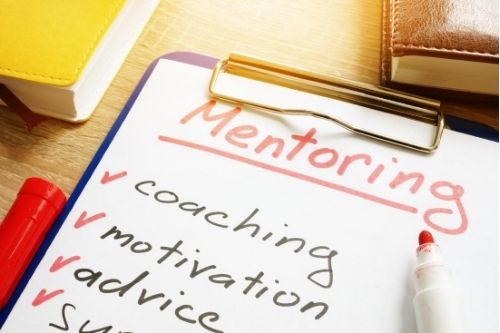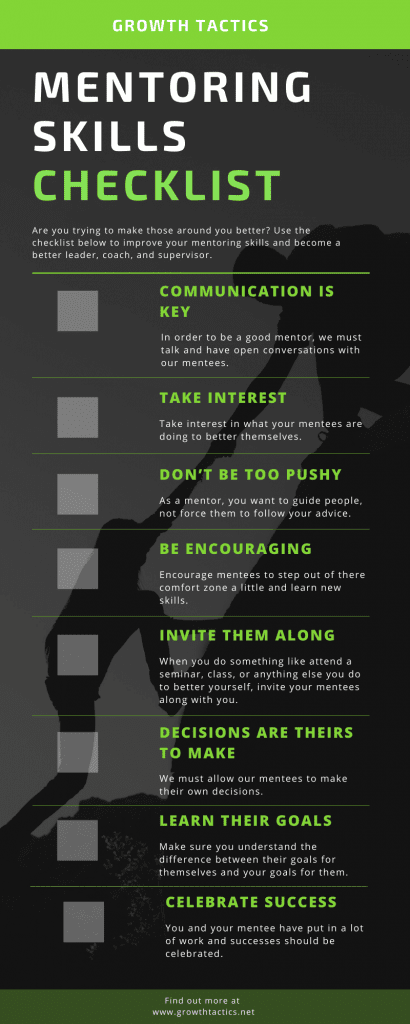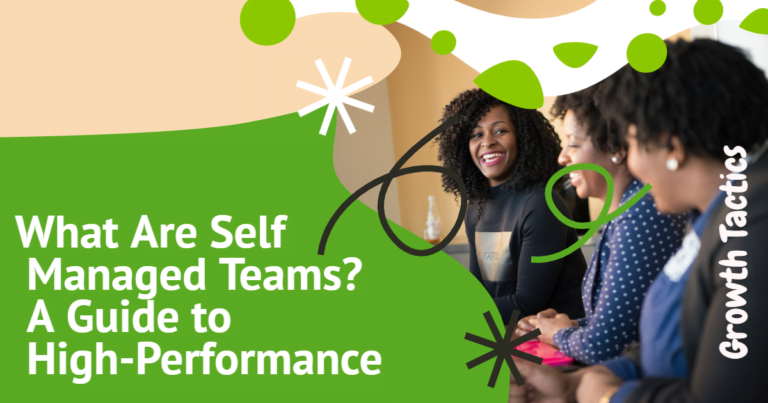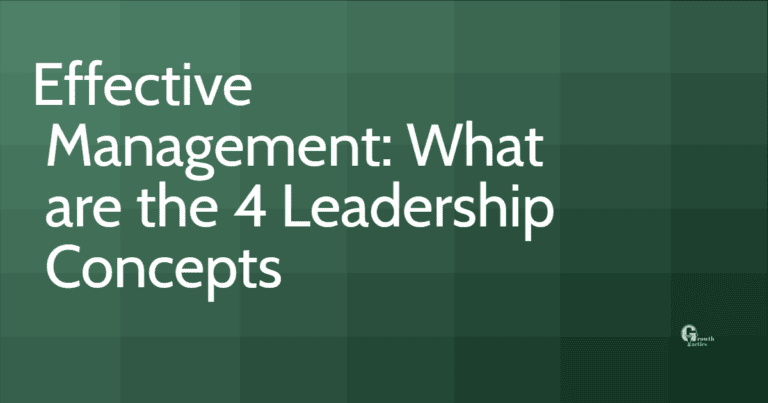Boosting your mentoring skills is a great way to not only make those around you better but also make yourself better. Being a mentor is one of the most rewarding opportunities you can have in life.
Continue reading to discover tips on how to be a mentor with employees, friends, and family. Don’t forget to download your free mentoring skills checklist.
Jump To Section
What is Mentoring?
Mentoring is also known as coaching leadership. True leaders coach others and take them under their wing to reach new heights in their lives. You can learn more about coaching leadership and other leadership styles in my article explaining 10 different leadership styles.
You can mentor people on a personal and professional level. In many cases, personal development and professional development will go hand in hand.
The Different Forms of Mentoring
Just like all people are different, mentoring comes in many different forms. The best mentors are great leaders who guide others in multiple aspects of their lives. It helps to know which type of mentoring will work best in which situation.
Motivational Mentoring
Have you ever had one of those people that it feels like just about every time you talk to them you walk away motivated to give life your best? These types of mentors can be very beneficial in improving productivity, attitude, and work fulfillment. People seem to flock to these leaders because of how they make them feel.
Teaching Mentor
A teaching mentor is always looking for the lesson in everything. They look to train others on everything from work to life. These types of mentors are always learning themselves so they always have something to train others on.
Ethical Mentor
Ethical mentors are the people everyone goes to for spiritual, ethical, and moral advice. These mentors are great at keeping people walking straight and narrow and always doing the right thing. They lead by example, including doing the right thing when nobody’s looking.
See Related: Brian Tracy Leadership Questionnaire
Mentor Topics
The following is a list of mentoring topics that may be of interest to you. This list is not all-inclusive but will give you an idea of topics that can be covered in mentoring.
- Academic/professional development
- Career planning (academic/non-academic)
- Creating a work-life balance
- Dealing with conflict in the workplace
- Dealing with difficult people/situations at work
- Goal setting and achieving goals (personal and professional)
- Managing finances (e.g., credit card debt, student loans, car loan, home mortgage, retirement planning)
- Managing personal relationships (family, friends, co-workers)
- Maintaining a positive attitude at work and in life (responding to setbacks and disappointments)
The Difference Between Training and Mentoring

Do you know the difference between a trainer and a mentor? Both values are important in a leader, but they are not the same. Training and mentoring are both tools used to increase subordinates’ skills. Training is the act of teaching an employee or team member their job. Mentoring is the act of developing an employee, team member, peer, friend, child, or anyone else as a person. Many times trainers are also excellent mentors but not all trainers have the leadership skills to be a mentor.
As a leader, we should always look for opportunities to not only train our subordinates but also mentor them. Improving your mentoring skills and mentoring those around you makes you a better supervisor, coach, and leader. Taking an active role in the professional and personal development of those around us is an investment that can pay dividends. These investments tend to pay off in the short term and the long term for both the mentee and the mentor.
Benefits of Mentoring
- The more people you coach the better your mentoring skills and leadership will become.
- Allows mentor and mentee to reflect on current practices.
- Increases job satisfaction for everyone involved.
- Successes are shared by both mentees and mentors.
- Personal and professional problem-solving abilities are increased.
- The mentee may become a promoter and teacher of the mentor’s vision.
Related Content: What are the benefits of mentoring?
How to Perform a Mentoring Session
These sessions provide a valuable opportunity to connect with your mentee, offer guidance, and support their growth. In this article section, I’ll guide you through the key steps and best practices of performing a successful mentoring session. Let’s jump right in!
1. Set Clear Goals to Help the Mentee
Before diving into the mentoring session, take a moment to establish clear goals with your mentee. Together, discuss what they hope to achieve, the skills they want to develop, and any challenges they face. This sets the foundation for a focused and impactful session.
2. Create a Supportive Environment: Establishing Trust and Building Rapport
Building a strong mentoring relationship relies on trust and open communication. Ensure a safe and supportive environment by actively listening to your mentee, validating their thoughts and experiences, and fostering a judgment-free space. Encourage them to freely express their ideas, concerns, and goals.
3. Be an Active Listener: Showing Genuine Interest
Active listening is an essential skill for any mentor. During the mentoring session, give your full attention to your mentee. Maintain eye contact, nod in understanding, and ask clarifying questions to show that you genuinely care about what they have to say. This creates a more engaging and productive conversation.
4. Provide Constructive Feedback: Guiding Growth
A crucial part of mentoring is giving constructive feedback. When offering suggestions or highlighting areas for improvement, do so in a positive and supportive manner. Focus on specific examples and provide actionable advice that empowers your mentee to enhance their skills and overcome challenges.
5. Ask Thought-Provoking Questions: Encouraging Self-Reflection
One of the goals of a mentoring session is to inspire mentees to think critically and reflect on their experiences. Ask open-ended questions that encourage them to explore different perspectives and consider alternative solutions. This prompts deeper self-reflection and increases their problem-solving skills.
6. Follow-Up and Continued Support: Nurturing Relationships
Remember that mentoring is an ongoing process. After each session, follow up with your mentee to check on their progress, address any concerns, and offer additional support. This demonstrates your dedication to their growth and reinforces the strong mentoring relationship you’ve built.
7. Adapt and Improve: Embracing Growth
Finally, recognize that mentoring is a dynamic journey for both the mentor and mentee. Be open to feedback and reflect on your own performance as a mentor. Continuously seek opportunities to grow and improve, so you can provide even better guidance and support for your mentee.
By following these steps and incorporating these best practices into your coaching and mentoring sessions, you’ll create a fulfilling and transformative experience for both yourself and your mentee. Remember, each mentoring session is a chance to inspire, guide, and unlock untapped potential. Start applying these strategies, and watch as your mentees thrive under your expert guidance.
Tips to Improve Key Mentoring Skills You Need
1. Communication is Key

Communication is one of the most important skills you can improve. To be a good mentor, we must talk and have open conversations with our mentees. This doesn’t necessarily mean we should always provide advice or chime into every conversation we overhear. If it’s something you have experience or extensive knowledge in feel free to offer your advice. Otherwise, the best option might be to become a listener for your mentee.
When you say communication, most people think about talking. Believe it or not, listening is extremely important. When you don’t listen to what the other person is saying you will never be on the same page as them. Sometimes all people need is someone to listen to them and care.
I can confidently say that body language is a critical component of effective communication. It’s not just the words we say that carry meaning; It’s also how we present ourselves physically. Our facial expressions, gestures, and posture convey a wealth of information that can either reinforce or contradict our verbal messages.
As a result, being aware of your own body language and reading your audience’s body language is essential. By paying attention to nonverbal cues, you can adjust your communication style, establish trust, and foster a deeper connection with others.
2. Take an Interest
Take interest in what your mentees are doing to better themselves. A genuine desire to make your mentees better is required to be a good mentor. When your employee does something like start classes, go to a leadership seminar, learn a new skill, etc. ask them about it.
Not only will this show them you care but you might also learn something too. Everyone has something to teach you. Even if it’s something you have extensive knowledge of, they may have a perspective you’ve never seen before.
3. Don’t Be Too Pushy

Just because you feel strongly about something doesn’t mean everyone else will. Be very cautious about pushing too hard. Many times, the harder you push, the less someone will listen to you. As a mentor, you want to guide people, not force them to follow your advice.
Sometimes people won’t listen, and you must allow them the freedom to make their own mistakes. After mistakes are made, try your best not to rub it in and say I told you so. Just help your mentee learn from the mistake and get through it.
4. Be Encouraging
Use your mentoring skills as a motivational mentor to encourage others. Being there for your mentees can really help get them to the next level. Encourage them to step out of their comfort zone a little and learn new skills.
Even if a mentee tries something and fails, they deserve encouragement for trying. You can also help them see the lessons they learned by trying. When your mentees see that you truly believe in them, they will work even harder to try not to let you down.
5. Celebrate Success

You and your mentee have put in a lot of work and successes should be celebrated. Many times, your mentee will come to you excited when they learn a new skill or complete one of their goals.
Share their excitement with them. Let them know how proud you are of them. This can be done in many ways. You can verbally let them know, you can take them out for lunch, and you can congratulate them in front of their peers in a meeting, just to name a few ways.
6. Invite Them Along
Your mentees are not the only ones that should be working on themselves. You should also be looking for opportunities to not only improve your mentoring skills but also improve all your skills. When you do something like attend a seminar, class, or anything else you do to better yourself, invite your mentees along with you.
Things like this can be a lot easier to do when you have someone you know with you. This also gives you someone to talk to about the lessons you learn. Talking about the stuff you learn not only gives you a conversation topic but also helps give you both a better understanding of the information learned.
7. Decisions are Theirs to Make
Although we never want to see our mentees make the wrong decision, at some point, it is bound to happen. We must allow our mentees to make their own decisions. Our goal is not to control our mentees or make them in our image.
We are trying to help our mentees be the best they can be. Sometimes this means allowing them to go in directions that we might not have gone in. We are there as mentors, to advise and support.
8. Discover Their Goals and Help Them Get There

To be a good mentor, you must know the goals of your mentee. Make sure you understand the difference between their goals for themselves and your goals for them. Don’t be afraid to directly ask your mentee what their personal and professional goals are. They may not be what you think, and they do change over time. Once you understand their goals, provide them with the tools and advice to achieve their goals.
9. Use the Right Leadership Style
Utilizing different leadership styles in mentoring is crucial to ensuring that the mentor/mentee relationship is effective and productive. There are several different leadership styles that can be applied in mentoring, including transformational, situational, and servant leadership. Each style has its own strengths and weaknesses, and it’s important to understand how to use them effectively.
10. Foster a Positive Learning Environment
Fostering a positive learning environment is critical to the success of any mentoring relationship. Creating an environment that is positive, supportive, and conducive to learning can help your mentee feel more comfortable, engaged, and motivated to learn. A positive learning environment can also help your mentee build their confidence, improve their skills, and achieve their goals.
11. Maintain Confidentiality and Professionalism
Maintaining confidentiality and professionalism is vital in any mentoring relationship. It is important to respect your mentee’s privacy and keep any sensitive information shared during the mentoring process confidential. Professionalism is also important to maintain a level of respect and trust in the relationship.
To maintain confidentiality and professionalism, it is important to establish clear boundaries and expectations at the outset of the mentoring relationship. You should also ensure that any information shared is kept in a secure location and only shared with those who have a legitimate need to know.
Mentoring Skills Checklist. What Makes a Good Mentor?
You can use the mentoring skills checklist below to help you on your journey to becoming an awesome mentor. Feel free to save, print, or link to this checklist for future usage.

Nurturing Your Mentor-Mentee Relationships
Building and nurturing successful mentor-mentee relationships is pivotal for both personal growth and professional development. Here’s a guide for mentors on maintaining these vital relationships:
1. Prioritize Effective Communication
Effective communication is the cornerstone. Engage in open, transparent conversations and practice active listening to truly understand your mentee’s needs and goals.
2. Set Achievable Goals
Help your mentee identify and set clear, achievable goals. It’s a fundamental first step to guide them towards their desired outcomes.
3. Provide Constructive Feedback
Offering honest, constructive feedback, including addressing difficult issues, is a hallmark of effective mentoring. It plays a crucial role in your mentee’s growth.
4. Cultivate Mutual Respect
A successful mentoring relationship is rooted in mutual respect. Show respect for your mentee’s ideas and perspectives to foster a good relationship.
5. Foster a Learning Environment
Embrace the role of both teacher and learner. Sharing personal experiences and new perspectives enriches the mentoring journey for both parties.
6. Develop a Structured Action Plan
Creating an action plan with specific skills and steps helps translate goals into concrete achievements, providing a clear path forward for your mentee.
7. Enhance Your Listening Skills
Listening is a vital skill. It allows you to understand your mentee’s perspective in a different way, facilitating more personalized guidance.
8. Recognize and Celebrate Progress
Acknowledging hard work and celebrating your mentee’s achievements is crucial. It boosts their confidence and reinforces the value of their effort and your guidance.
9. Be Willing to Adapt
Professional and personal growth involves embracing new ideas and approaches. Stay open to adopting different perspectives and updating your mentoring strategies as needed.
10. Invest in the Relationship
The effectiveness of the mentoring relationship significantly benefits from regular, dedicated efforts. Commit to being a positive role model and providing your undivided attention.
Remember, being a great mentor not only impacts your mentee’s development but also contributes to your own professional network and personal growth. Keep these points in mind to cultivate a meaningful and successful mentoring relationship.
Online Mentoring Resources
Below are some resources where you can offer your mentoring services or receive some mentoring:
- Mentoring.org is a site where you can offer your skills virtually by mentoring youths.
- Growth Mentor is a site that offers mentors mostly focused on the growth marketing niche.
- Score is a nonprofit organization offering business mentorship.
- Trilogy Mentors offer tutoring and mentorship to children focusing on education.
- The Muse is a site offering career coaching and mentorship.
Wrapping Up How to Be a Mentor
Mentees come in many forms. They can be employees, peers, friends, family, or just about anyone. You just need to keep your eyes open for opportunities to help others. These opportunities arise every day, be ready for them.
The best leaders coach others to be better today than they were yesterday and even better tomorrow. Being a mentor can be very rewarding. Helping others achieve their potential is an amazing feeling.
If you enjoyed this article on boosting your mentoring skills, please don’t forget to share using the buttons below.









